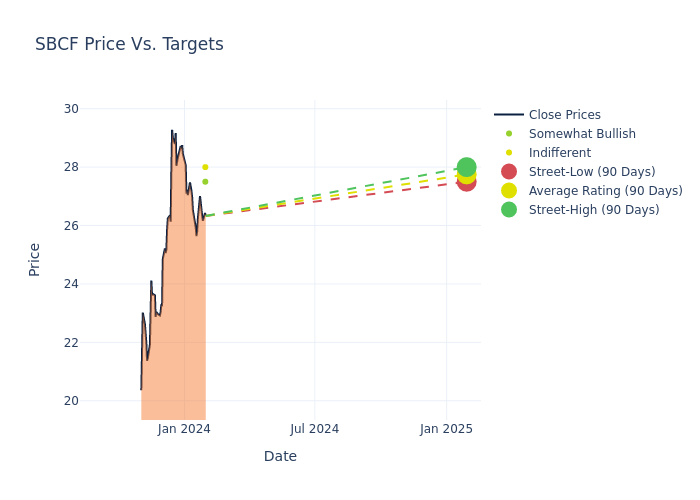Analysts' ratings for Seacoast Banking SBCF over the last quarter vary from bullish to bearish, as provided by 4 analysts.
In the table below, you'll find a summary of their recent ratings, revealing the shifting sentiments over the past 30 days and comparing them to the previous months.
| Bullish | Somewhat Bullish | Indifferent | Somewhat Bearish | Bearish | |
|---|---|---|---|---|---|
| Total Ratings | 1 | 1 | 2 | 0 | 0 |
| Last 30D | 0 | 1 | 1 | 0 | 0 |
| 1M Ago | 0 | 0 | 1 | 0 | 0 |
| 2M Ago | 1 | 0 | 0 | 0 | 0 |
| 3M Ago | 0 | 0 | 0 | 0 | 0 |
Insights from analysts' 12-month price targets are revealed, presenting an average target of $29.38, a high estimate of $33.00, and a low estimate of $27.50. Observing a 17.52% increase, the current average has risen from the previous average price target of $25.00.

Breaking Down Analyst Ratings: A Detailed Examination
The analysis of recent analyst actions sheds light on the perception of Seacoast Banking by financial experts. The following summary presents key analysts, their recent evaluations, and adjustments to ratings and price targets.
| Analyst | Analyst Firm | Action Taken | Rating | Current Price Target | Prior Price Target |
|---|---|---|---|---|---|
| Michael Young | Truist Securities | Lowers | Hold | $28.00 | $29.00 |
| David Feaster | Raymond James | Raises | Outperform | $27.50 | $23.00 |
| Michael Young | Truist Securities | Announces | Hold | $29.00 | - |
| Michael Young | Truist Securities | Raises | Buy | $33.00 | $23.00 |
Key Insights:
- Action Taken: In response to dynamic market conditions and company performance, analysts update their recommendations. Whether they 'Maintain', 'Raise', or 'Lower' their stance, it signifies their reaction to recent developments related to Seacoast Banking. This insight gives a snapshot of analysts' perspectives on the current state of the company.
- Rating: Delving into assessments, analysts assign qualitative values, from 'Outperform' to 'Underperform'. These ratings communicate expectations for the relative performance of Seacoast Banking compared to the broader market.
- Price Targets: Understanding forecasts, analysts offer estimates for Seacoast Banking's future value. Examining the current and prior targets provides insight into analysts' changing expectations.
Understanding these analyst evaluations alongside key financial indicators can offer valuable insights into Seacoast Banking's market standing. Stay informed and make well-considered decisions with our Ratings Table.
Stay up to date on Seacoast Banking analyst ratings.
About Seacoast Banking
Seacoast Banking Corp of Florida is a holding company for Seacoast National Bank. The Company provides integrated financial services including commercial and consumer banking, wealth management, and mortgage and insurance services to customers across Florida, and through mobile and online banking solutions. In addition, it provides services such as treasury management, brokerage, and credit facilities.
Seacoast Banking: Delving into Financials
Market Capitalization Analysis: Falling below industry benchmarks, the company's market capitalization reflects a reduced size compared to peers. This positioning may be influenced by factors such as growth expectations or operational capacity.
Revenue Challenges: Seacoast Banking's revenue growth over 3 months faced difficulties. As of 31 December, 2023, the company experienced a decline of approximately -6.52%. This indicates a decrease in top-line earnings. As compared to its peers, the revenue growth lags behind its industry peers. The company achieved a growth rate lower than the average among peers in Financials sector.
Net Margin: Seacoast Banking's net margin falls below industry averages, indicating challenges in achieving strong profitability. With a net margin of 23.05%, the company may face hurdles in effective cost management.
Return on Equity (ROE): Seacoast Banking's ROE is below industry standards, pointing towards difficulties in efficiently utilizing equity capital. With an ROE of 1.42%, the company may encounter challenges in delivering satisfactory returns for shareholders.
Return on Assets (ROA): Seacoast Banking's ROA is below industry standards, pointing towards difficulties in efficiently utilizing assets. With an ROA of 0.2%, the company may encounter challenges in delivering satisfactory returns from its assets.
Debt Management: Seacoast Banking's debt-to-equity ratio is below the industry average. With a ratio of 0.07, the company relies less on debt financing, maintaining a healthier balance between debt and equity, which can be viewed positively by investors.
The Core of Analyst Ratings: What Every Investor Should Know
Benzinga tracks 150 analyst firms and reports on their stock expectations. Analysts typically arrive at their conclusions by predicting how much money a company will make in the future, usually the upcoming five years, and how risky or predictable that company's revenue streams are.
Analysts attend company conference calls and meetings, research company financial statements, and communicate with insiders to publish their ratings on stocks. Analysts typically rate each stock once per quarter or whenever the company has a major update.
Beyond their standard evaluations, some analysts contribute predictions for metrics like growth estimates, earnings, and revenue, furnishing investors with additional guidance. Users of analyst ratings should be mindful that this specialized advice is shaped by human perspectives and may be subject to variability.
This article was generated by Benzinga's automated content engine and reviewed by an editor.
© 2025 Benzinga.com. Benzinga does not provide investment advice. All rights reserved.
date | ticker | name | Price Target | Upside/Downside | Recommendation | Firm |
|---|
Trade confidently with insights and alerts from analyst ratings, free reports and breaking news that affects the stocks you care about.